
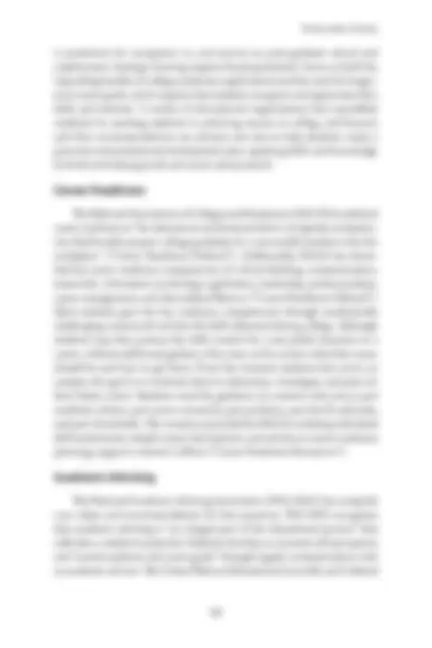

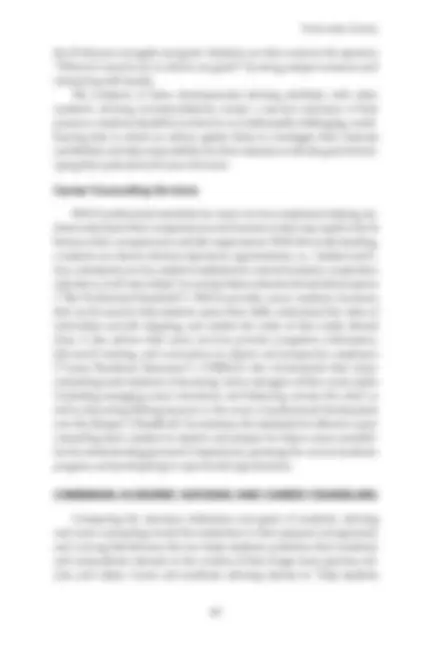
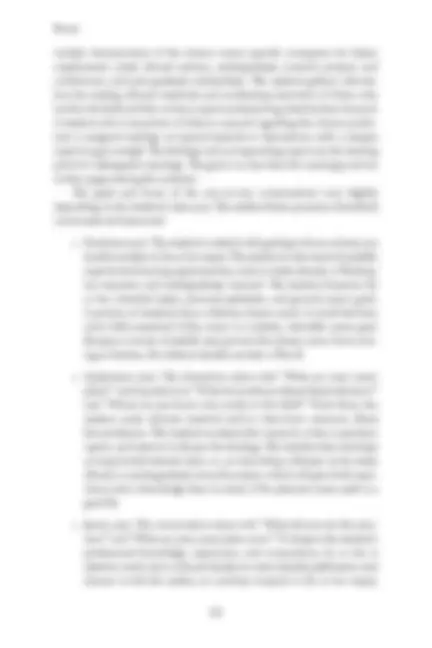
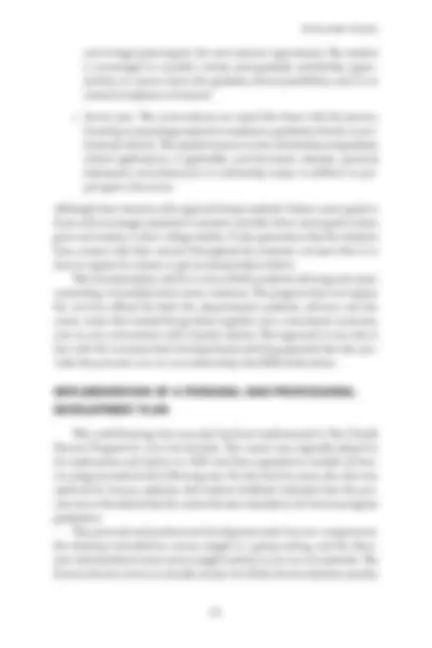
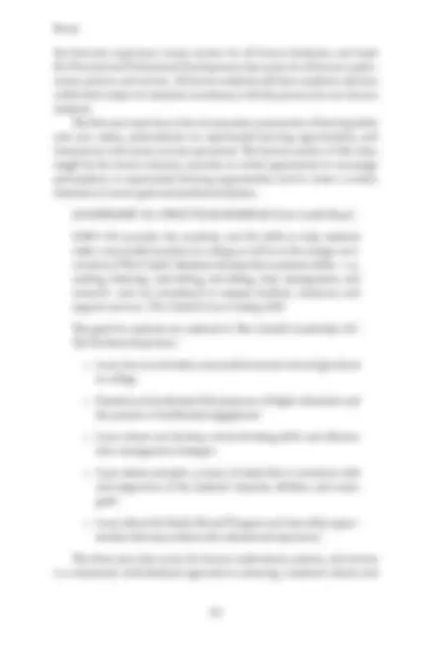
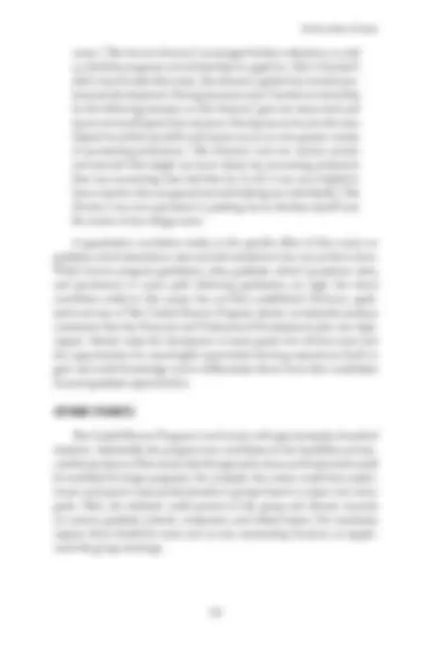
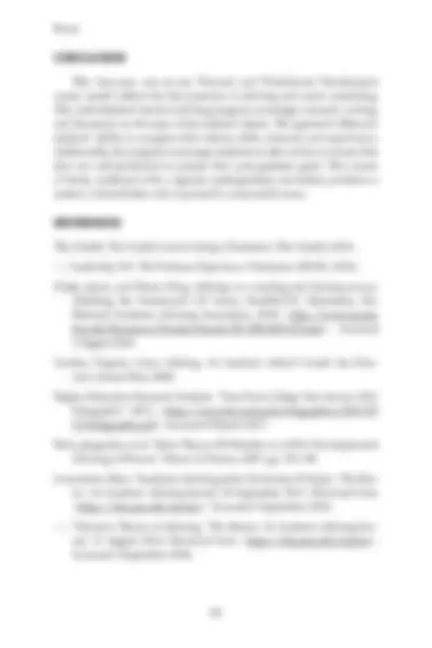
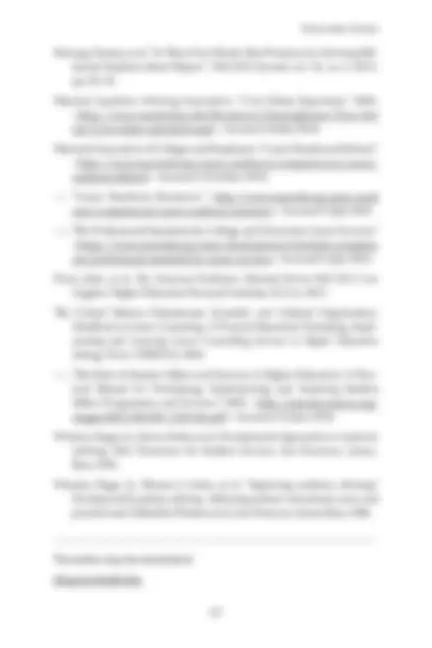


Study with the several resources on Docsity

Earn points by helping other students or get them with a premium plan


Prepare for your exams
Study with the several resources on Docsity

Earn points to download
Earn points by helping other students or get them with a premium plan
Community
Ask the community for help and clear up your study doubts
Discover the best universities in your country according to Docsity users
Free resources
Download our free guides on studying techniques, anxiety management strategies, and thesis advice from Docsity tutors
This document emphasizes the importance of intertwining academic advising and career exploration early in a student's college experience. It discusses the benefits of developmental academic advising and career counseling, as well as the key competencies for career readiness identified by the National Association of Colleges and Employers (NACE). The document also recommends the role of a mentor and the importance of experiential learning opportunities.
Typology: Study notes
1 / 15

This page cannot be seen from the preview
Don't miss anything!










The Citadel
tudents arrive on a college campus full of excitement for their futures; most of them wholeheartedly and enthusiastically embrace the culture of learning, the newfound independence, and the pursuit of nonacademic inter- ests that typify the college experience Unfortunately, a student’s subsequent daily life can be dominated by such questions as how to do well in classes, how to keep scholarships, how to balance a part-time job, and how to find time for extracurricular activities Many of the skills necessary to thrive at college—such as managing time, dealing with roommates and stress, devel- oping rapport with faculty, mastering the educational material, and planning for a career—can be overwhelming to young college students A survey of first-year college students in 2012 reported that 47% struggled with effective time management, 47% had difficulty getting along with their roommate, 41% were dissatisfied with the relevance of coursework, 42% frequently felt
overwhelmed by all they had to do, 35% switched majors, 33% had difficulty adjusting to the demands of the coursework, 33% had a hard time develop- ing effective study skills, and 25% left college before their sophomore year (Higher Education Research Institute) Meanwhile, as educators we strive to encourage intellectual curiosity, to inspire a love of learning, to foster the application of knowledge, to embrace self-reflection, and to develop the whole person We aim to assist them in developing the character of a critical thinker, in maturing as an individual, and in progressing toward becoming a success within their chosen field, i e , we aim to assist them in their personal and professional development To accomplish this aim, we need to meet stu- dents where they are Since 2009 almost 90% of the surveyed college freshmen have identi- fied “getting a better job” as a major reason for attending college (Pryor et al) College educators can help students work towards this goal by produc- ing mature, critical-thinking graduates who are well-prepared not only for life but also for a career Many students, unfortunately, do not participate in the frequent, developmental interaction that provides encouragement and guid- ance in examining and developing their future career goals They can best choose a career by identifying a confluence of aptitudes, experiences, and passions Students’ post-graduate plans and a pathway for making these plans a reality merit deep inquiry While most students periodically interact with an academic advisor within their major, these meetings frequently focus on scheduling and class selection issues While these discussions are important to ensure degree completion and on-time graduation, they do not provide the guided introspection that aids in the development of a career plan Aca- demic advisors are sometimes not trained or equipped to provide significant career exploration Career advising, on the other hand, is not necessarily as structured or proactive as many students need All too often, gathering infor- mation on careers and career choice is a student-driven activity that occurs only late in a student’s college experience, left to offhand and belated trips to career services A benefit to both the student and the college would be to intertwine career exploration and academic advising within a defined cur- riculum no later than the first semester of the student’s sophomore year at college
Our challenge is not only to encourage the overall growth and learning of each student but also to make the learning strategic so that the student
ragan
Organization (UNESCO) recommends that academic advising activities include assisting with “decision-making and career direction,” interpreting “interest/ability inventories,” and selecting other “educational experiences” such as internships and study abroad; these advising activities should be per- formed in addition to the standard advising role of aiding in the selection of courses and evaluating progress towards goals (“The Role of Student Affairs”) The NACADA and UNESCO standards suggest that successful academic advising uses contact with an advisor to develop students’ potential and career direction by effectively gauging their interests and abilities Numerous academic advising advocates have added to these standards in their studies of the key attributes of effective advising Their work suggests that successful advising is integrative, helping “students make meaning out of their educa- tion as a whole,” and that students “should expect their advising relationship to be an intellectually challenging one that will require substantial effort on their parts but will offer extraordinary rewards as well” (Lowenstein, “Toward a Theory”) Given both the effort and time needed for a student to be fully involved and also the importance of the learning that occurs, advising should take place in a structured, credit-bearing class: “this reflective learning is so important in institutions of higher learning that the student should earn credit toward graduation” (Lowenstein, “Academic Advising”) Despite various theories and approaches to academic advising, develop- mental advising has become the most common advising approach used in honors programs (Klein et al) Developmental academic advising is a “sys- tematic process based on a close student-advisor relationship intended to aid students in achieving education, career, and personal goals through the utilization of the full range of institutional and community resources” (Win- ston, Grites, et al ) Developmental advising leads students to “realize their maximum educational potential through communication and information exchanges with an advisor” (Winston, Ender, et al ) By continually interact- ing with an advisor, students develop a plan on how to achieve personal and professional goals: “The relationship goes beyond typical advising issues such as registration and class scheduling, tapping into academic competence, per- sonal involvement, and developing life goals” (Klein et al) Drake and King of NACADA recommend approaching advising as a teaching and learning process, with the student exploring the questions “Who am I?” and “What do I want to do with my life?” Students can explore the for- mer through personality inventories and self-reflection and the latter through short- and long-term goal setting, career exploration, and a clarification of
ragan
the fit between strengths and goals Students can then examine the question “What do I need to do to achieve my goals?” by using campus resources and interacting with faculty The inclusion of these developmental advising attributes with other academic advising recommendations creates a succinct summary of best practices: students should be involved in an intellectually challenging, credit- bearing class in which an advisor guides them to investigate their interests and abilities and take responsibility for their education with the goal of devel- oping their potential and career direction
Career Counseling Services
NACE professional standards for career services emphasize helping stu- dents understand their competencies and interests so they may explore the fit between their competencies and job requirements With this understanding, a student can choose relevant experience opportunities, i e , “student activi- ties, community service, student employment, research projects, cooperative education, [and] internships” to increase future educational and job prospects (“The Professional Standards”) NACE provides career readiness resources that can be used to help students assess their skills, understand the value of internships and job mapping, and market the value of their study abroad time; it also advises that career services provide occupation information, job-search training, and connections to alumni and prospective employers (“Career Readiness Resources”) UNESCO also recommends that career counseling assist students in becoming “active managers of their career paths (including managing career transitions and balancing various life roles) as well as becoming lifelong learners in the sense of professional development over the lifespan” ( Handbook ) In summary, the standards for effective career counseling lead a student to explore and prepare for future career possibili- ties by understanding personal competencies, pursuing the correct academic program, and participating in experiential opportunities
Comparing the summary definitions and goals of academic advising and career counseling reveals the similarities in their purpose and approach, and a strong link between the two helps students synthesize their academic and nonacademic interests in the context of their longer-term passions, tal- ents, and values Career and academic advising interact to “help students
structurEd coursE
student’s future The faculty mentor, as suggested by Montag et al , coordi- nates personal developmental advising and career planning services Through this four-year approach, students develop a personal relationship that guides them in discussing and assessing their interests and abilities, that encourages them to engage in additional experiential opportunities (such as study away programs, research, and internships), and that coordinates their academic and career goals
The goal of a Personal and Professional Development class is multi-faceted:
1 To hone a student’s knowledge of his/her chosen profession
2 To verify that the profession is a good choice given the student’s apti- tudes and interests
3 To assess the best methods for achieving professional success
4 To develop faculty contacts
5 To improve each student’s research, writing, and discussion skills
During the first semester of the freshman year, as part of a first-year expe- rience class, the student assesses personal aptitudes and interests, describes career goals, and investigates experiential learning opportunities In a one-on- one tutorial setting during the sophomore through senior years, the student receives individualized attention from the mentor on the student’s chosen profession and how to be a competitive candidate for that profession The student and mentor meet every two weeks during the fall semester of each year to engage in a program of research, writing, discussion, and strategizing about the student’s post-graduate goals At the beginning of the sophomore, junior, and senior years, the student self-reflects and reports on the previous year’s preparations for post-graduate goals Then, the student develops a plan for the coming year to become more competitive for post-graduate endeav- ors Typical areas of research, discussion, and pursuit include internships, research projects, study abroad opportunities, summer work experience, graduate schools, and prospective employers During these meetings, the student reviews past discussions of the future career and new questions that have come to mind Research topics often
structurEd coursE
include characteristics of the chosen career, specific companies for future employment, study abroad options, undergraduate research projects and conferences, and post-graduate scholarships The student gathers informa- tion by reading relevant materials and conducting interviews of those who work in the field and then writes a report summarizing what has been learned A student who is uncertain of what to research regarding the chosen profes- sion is assigned readings on topical material or interactions with a campus expert to gain insight The findings and corresponding report are the starting point for subsequent meetings The goal is no less than five meetings and ten written pages during the semester The goals and focus of the one-on-one conversations vary slightly depending on the student’s class year The outline below presents a beneficial conversational framework
- Freshman year: The student is tasked with getting to know at least one faculty member in his or her major The student is informed of available experiential learning opportunities, such as study abroad, a Washing- ton semester, and undergraduate research The student discusses his or her intended major, personal aptitudes, and general career goals A portion of students have a lifetime dream career in mind but have never fully examined if this career is a realistic, desirable career goal Because a variety of pitfalls may prevent this dream career from com- ing to fruition, the student should consider a Plan B - Sophomore year: The discussion starts with “What are your career plans?” and transitions to “What do you know about that profession?” and “Whom do you know who works in this field?” From there, the student reads relevant material and/or interviews someone about this profession The student conducts this research, writes a summary report, and returns to discuss the findings The student then develops an experiential summer plan, i e , an internship, volunteer work, study abroad, or undergraduate research project, which will give both expe- rience and a knowledge base to assess if the planned career path is a good fit - Junior year: The conversation starts with “What did you do this sum- mer?” and “What are your career plans now?” To deepen the student’s professional knowledge, experience, and connections, he or she is asked to reach out to relevant faculty, to read a faculty publication and discuss it with the author, to continue research in his or her major,
ragan
the first-year experience course section for all honors freshmen, and leads the Personal and Professional Development class series for all honors sopho- mores, juniors, and seniors All honors students still have academic advisors within their majors to maintain consistency with the process for non-honors students The first-year experience class incorporates assessments of learning styles and core values, presentations on experiential learning opportunities, and interactions with career services personnel The honors section of this class, taught by the honors director, provides an initial opportunity to encourage participation in experiential learning opportunities and to create a written statement of career goals and professional plans
LEADERSHIP 101: FIRST-YEAR SEMINAR (One Credit Hour)
LDRS 101 provides the academic and life skills to help students make a successful transition to college as well as to the unique envi- ronment of The Citadel Students develop their academic skills—i e , reading, listening, note-taking, test-taking, time management, and research—and are introduced to campus facilities, resources, and support services ( The Citadel Course Catalog 104)
The goals for students are outlined in The Citadel’s Leadership 101: The Freshman Experience :
- Learn how to and make a successful transition from high school to college - Examine and understand the purposes of higher education and the practice of intellectual engagement - Learn about and develop critical thinking skills and effective time-management strategies - Learn about and plan a course of study that is consistent with and supportive of the student’s interests, abilities, and career goals - Learn about the Study Abroad Program and internship oppor- tunities that may enhance the educational experience
The three-year class series for honors sophomores, juniors, and seniors is a structured, individualized approach to assessing a student’s talents and
ragan
strategizing to achieve professional goals Meeting with each student one-on- one, the honors director creates a mentorship, learning, and accountability process for developing a professional plan The focus of the research, writings, and discussions is individualized by student and class year
HONR 211, 311, and 411: Honors Personal and Professional Devel- opment I, II, and III
Taught entirely in tutorial, this sequence directs students in a three- year period of research, writing, and discussion on the subject of their professional goals, encouraging them to envision their leader- ship in their future profession and guiding them in exploring through research and writing the ideals as well as the facts of that profession Three credit hours (PASS/FAIL) are granted upon completion of HONR 411 ( The Citadel Course Catalog 103)
This class series motivates students to research and plan for their careers and to focus on what they will do after graduation The structure of the series, as a continually iterative process of exploration, discussion, and decision-mak- ing, uncovers and allows for alterations in goals and aspirations Career paths and interests change as students get further into their coursework, interact with faculty, undertake research or internships, and investigate what it means to be a member of their chosen profession Moreover, students’ semester abroad experiences, their interactions with faculty, and their research raise their curiosity, their aspirations, and their confidence As an example of the success of this plan, a young man stated during his college interview that he planned to major in either business or political sci- ence and have a career in the Army after graduation During his freshman year, through the first-year experience class taught by his mentor, he learned about the Washington Semester Program, undergraduate research opportunities, and study abroad options He applied for the Washington Semester Program and was accepted for the fall semester of 2008 He spent the summer of 2008 attending the competitive Army Airborne school; then he spent the fall Wash- ington semester as a fellow in the national office of a U S congressman He returned to college for the spring semester, immediately beginning a research project in the political science department, as encouraged by his faculty men- tor Additionally, during the spring 2009 semester he pursued and received a scholarship for a summer study abroad, which he spent in Spain When he returned to college in the fall of 2009, he was a junior who had proudly stud- ied away in Spain and Washington, D C , and worked on a research project
structurEd coursE
career [The honors director] encouraged further education, as well as scholarly programs and scholarships to apply for After I decided I didn’t want to take that route, [the director] guided me towards pro- fessional development During my junior year I landed an internship for the following summer, so [the director] gave me many tools and tips to set myself apart from my peers During my senior year the class helped me polish my skills and expose me to an even greater variety of accounting professions [The director] sent me various articles and journals that taught me more about my accounting profession than any accounting class had thus far In all, it was very helpful to have a mentor who was geared towards helping me individually [The director] was very persistent in pushing me to develop myself over the course of my college career
A quantitative correlation study on the specific effect of this course on graduate school attendance rates and job satisfaction has not yet been done While honors program graduation rates, graduate school acceptance rates, and persistence in career path following graduation are high, the direct correlation solely to this course has not been established However, quali- tative surveys of The Citadel Honors Program alumni consistently produce comments that the Personal and Professional Development plan was high- impact Alumni value the discussions of career goals over all four years and the opportunities for meaningful experiential learning experiences both to gain real-world knowledge and to differentiate them from other candidates for post-graduate opportunities
The Citadel Honors Program is mid-sized, with approximately a hundred students Admittedly, the program size contributes to the feasibility and suc- cessful execution of this course, but the approach, focus, and framework could be modified for larger programs For example, the course could have sopho- mores and juniors meet predominately in groups based on major and career goals Then, the students could present to the group and discuss research on careers, graduate schools, companies, and related topics For maximum impact, there should be some one-on-one mentorship, however, to supple- ment the group meetings
structurEd coursE
This four-year, one-on-one Personal and Professional Development course model reflects the best practices in advising and career counseling This individualized mentor/advising program encourages research, writing, and discussion on the topic of the student’s future The approach influences students’ ability to recognize their talents, skills, interests, and experiences Additionally, the program encourages students to take actions to ensure that they are well-positioned to pursue their post-graduate goals This course of study, combined with a rigorous undergraduate curriculum, produces a mature, critical thinker who is poised for a successful career
The Citadel The Citadel Course Catalog Charleston: The Citadel, 2016
— Leadership 101: The Freshman Experience Charleston: MUSC, 2016
Drake, Jayne, and Nancy King Advising as a teaching and learning process (Building the Framework CD Series, Rec001CD) Manhattan, KS: National Academic Advising Association, 2010 <http://wwwnacada ksu edu/Resources/Product-Details/ID/REC001CD aspx> Accessed 3 August 2016
Gordon, Virginia Career Advising: An Academic Advisor’s Guide San Fran- cisco: Jossey-Bass, 2006
Higher Education Research Institute “Your First College Year Survey 2012 Infographic ” 2013 <https://wwwheri ucla edu/infographics/2012-YF CY-Infographic pdf> Accessed 8 March 2017
Klein, Jacqueline, et al “More Than an ID Number or a GPA: Developmental Advising in Honors ” Honors in Practice , 2007, pp 101–
Lowenstein, Marc “Academic Advising at the University of Utopia “ The Men- tor: An Academic Advising Journal , 28 September 2011 Retrieved from <https://dus psu edu/mentor> Accessed 5 September 2016
— “Toward a Theory of Advising “ The Mentor: An Academic Advising Jour- nal , 12 August 2014 Retrieved from <https://duspsu edu/mentor> Accessed 5 September 2016
ragan